 MyDogBreeds
MyDogBreeds Slovakian Hound is originated from Slovakia but Cane Corso is originated from Italy. Slovakian Hound may grow 23 cm / 9 inches shorter than Cane Corso. Slovakian Hound may weigh 33 kg / 72 pounds lesser than Cane Corso. Both Slovakian Hound and Cane Corso has almost same life span. Both Slovakian Hound and Cane Corso has same litter size. Slovakian Hound requires Low maintenance. But Cane Corso requires Moderate maintenance
Slovakian Hound is originated from Slovakia but Cane Corso is originated from Italy. Slovakian Hound may grow 23 cm / 9 inches shorter than Cane Corso. Slovakian Hound may weigh 33 kg / 72 pounds lesser than Cane Corso. Both Slovakian Hound and Cane Corso has almost same life span. Both Slovakian Hound and Cane Corso has same litter size. Slovakian Hound requires Low maintenance. But Cane Corso requires Moderate maintenance
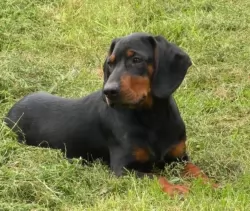 The Slovakian Hound is also known as the Slovenský Kopov or the Black Forest Hound. This is a scenthound which comes from Slovakia in Central Europe and has been bred for boar hunting.
The Slovakian Hound is also known as the Slovenský Kopov or the Black Forest Hound. This is a scenthound which comes from Slovakia in Central Europe and has been bred for boar hunting.
The breed was first recognized in the 1870s, with dogs such as the Austrian Black and Tan Hound as well as the Hungarian Greyhound being thought to be part of dogs ancestry. The breed club was established in 1988 and is recognized by the FCI.
 As a descendant of the Canis pugnax, the Cane Corso dog which hails from Italy has been used for guarding livestock and property. The Corso’s lineage goes far back to ancient Roman times, with the name of dog actually meaning bodyguard dog.
As a descendant of the Canis pugnax, the Cane Corso dog which hails from Italy has been used for guarding livestock and property. The Corso’s lineage goes far back to ancient Roman times, with the name of dog actually meaning bodyguard dog.
As life changed in Italy, the Corso became more rare so that some enthusiasts of the breed began to look at helping the dog recover from the brink of extinction. By 1994, the breed was accepted by the Italian Kennel Club and the dog was also recognized internationally, with the American Kennel Club recognizing the Cane Corso in 2010.
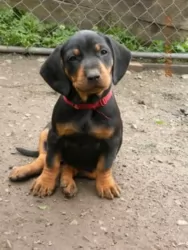 The Slovakian Hound is a muscular dog of medium height and with a long tail and long drop ears. The short coat is always black with tan markings.
The Slovakian Hound is a muscular dog of medium height and with a long tail and long drop ears. The short coat is always black with tan markings.
These compact looking dogs stand in height at about 43 to 47cm and weigh in the region of 14 to 17kg. The face is friendly and the eyes alert and bright.
Independent and intelligent, the Solvakian Hound will learn some basic commands easily. He is adaptable and will fit into life in the countryside as well as the city, so long as he is well exercised.
He is a sociable, playful dog and will do well with children, particularly if he has been trained and socialized. He is also a good choice for the first-time dog owner. He is alert and makes a good watchdog too.
 The Cane Corso is a large dog which hails from Italy. He is a molosser. The dog is muscled and is somewhat less bulkier than other Mastiff breeds. He is 64-70 cm in height and he weighs 45-50 kg.
The Cane Corso is a large dog which hails from Italy. He is a molosser. The dog is muscled and is somewhat less bulkier than other Mastiff breeds. He is 64-70 cm in height and he weighs 45-50 kg.
The head of the Cane Corso is large and the ears are cropped and stand erect. The tail is also traditionally docked to give the dog a distinctive look, but these days, with regulations regarding tail docking, the dog can also be seen with a full tail.
The Corso has a short coat which comes in fawn shades, gray, red, brindle or black shades. White markings are common on the chest, chin, toes and sometimes on the nose.
The Corso is a working dog who needs lots of mental and physical stimulation. He’s an inquisitive dog who is confident and ready to meet life as it comes. He’ll want a strong, firm owner with leadership qualities. He'll require training and socialization and then he becomes an affectionate, obedient pet who gets on well with all members of the family as well as other pets. He is a highly intelligent dog and responds well to training.
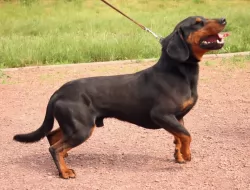 His job as a hunting dog has meant that the Slovakian Hound is a brave, energetic, determined dog.
His job as a hunting dog has meant that the Slovakian Hound is a brave, energetic, determined dog.
As a pet and companion, you won’t be disappointed as he puts as much effort into his relationships with his human family as he does with hunting.
This amicable dog makes a wonderfully loyal and devoted pet, companion and guard dog.
 The Cane Corso is known for his agility and athleticism. He is full of energy and he also wants lots of attention and companionship from his human family. With proper training and socialization his temperament changes so that he becomes a super friend and companion while also being protective.
The Cane Corso is known for his agility and athleticism. He is full of energy and he also wants lots of attention and companionship from his human family. With proper training and socialization his temperament changes so that he becomes a super friend and companion while also being protective.
The dog is attentive and receptive to training. The way a dog turns out is essentially what the owners are like, and many Cane Corso dogs have been blamed for being aggressive because they’ve been brought up by aggressive, abusive and irresponsible owners.
The Cane Corso is a large dog with an exuberant nature and who expresses his joy by snorting, wheezing, grunting and slobbering. Treat him well as a family member and you’re going to have a wonderful friend and protector.
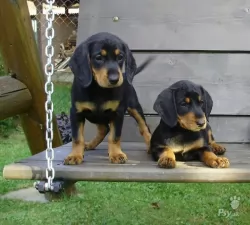 Most dogs at some or other time will be faced with a particular health challenge. Most times the veterinarian can fix these problems with the right kind of treatment.
Most dogs at some or other time will be faced with a particular health challenge. Most times the veterinarian can fix these problems with the right kind of treatment.
The Slovakian Hound is a healthy dog breed and you aren’t likely to come up with too many problems, though it it wise to be aware of some of the more common dog illnesses there are -
This is something you can expect as your Slovakian Hound ages. It is brought on by tissue degeneration. With eyes, dogs can develop cataracts. With his ears, consistently cleaning and watching out for ear infections can also help with slowing down hearing loss.
Apart from hip dysplasia which can start with even very young dogs, osteoarthritis can cause joint pain and stiffness of joints. It’s a degenerative disease, but fortunately there are a number of treatments to alleviate pain. Remember that nutrition plays a huge role in reducing joint problems in dogs.
Cancer is also a disease that has no respect for the age of the dog or dog breed. When you brush your pet, feel for any unusual lumps. Not all lumps are cancerous but it will be a good idea to have your pet checked over by the vet.
 The life expectancy of the Cane Corso is 10 to 12 years. He is a large, healthy dog breed, but all large dogs are inclined towards bone and joint problems which includes hip dysplasia. Your Cane Corso is also prone to eye defects.
The life expectancy of the Cane Corso is 10 to 12 years. He is a large, healthy dog breed, but all large dogs are inclined towards bone and joint problems which includes hip dysplasia. Your Cane Corso is also prone to eye defects.
Strangely, dogs have 3 eyelids, with the third eyelid being home to tear producing gland. There are some dogs where the ligament fails so that the gland pops out, looking like a cherry stuck at the inner corner of the eye. The veterinarian will be able to perform surgery to attach the gland back.
There are dogs where the eyelids roll inwards. Entropion causes hair to rub on the surface of the eye, resulting in pain and also damage to the cornea. Sometimes surgery will be necessary to fix the eyelid.
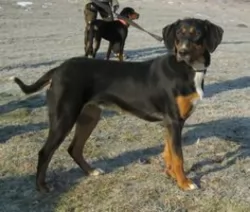 ● Like every other dog, the Slovakian Hound will need exercise if he is to remain healthy and fit. There are lots of back-yard games for dogs such as hide and seek and ball and rope games. He will also love a daily walk.
● Like every other dog, the Slovakian Hound will need exercise if he is to remain healthy and fit. There are lots of back-yard games for dogs such as hide and seek and ball and rope games. He will also love a daily walk.
● Always provide your dog with the best food there is as this encourages good health. Your Slovakian Hound requires top quality food, and while there are some good commercially manufactured foods on the market, it is important to choose the high quality ones that have natural, good ingredients in them.
Try to include some home-made food for him which can be simply mixed into the dry kibble twice a week. Boiled chicken, brown rice or pasta and spinach, sweet potatoes and carrots is super tasty and nutritious. Also try to include some raw meat into the diet occasionally as this helps with preventing skin diseases.
● Trim your Slovakian Hound's nails and check his eyes and ears for infection. The inside of the ears shouldn’t be red and the eyes should be clear and bright. If he will allow you to, check inside his mouth too to make sure there are no bad teeth.
● Don’t allow your dog to have puppies. There are so many unwanted puppies all over the world. Rather have him or her spayed or neutered to avoid puppies that nobody wants. It is beneficial for his health too.
 The short coat sheds fairly heavily twice a year. His coat will certainly need a brush twice a week but during shedding time it will be more often if you want to avoid your home being full of hair. As you brush, its the chance to check for fleas, ticks and skin infections.
The short coat sheds fairly heavily twice a year. His coat will certainly need a brush twice a week but during shedding time it will be more often if you want to avoid your home being full of hair. As you brush, its the chance to check for fleas, ticks and skin infections.
Brush your Cane Corso’s teeth at least 2 or 3 times a week to remove tartar build-up. If you don’t there is the problem of bacteria which can result in gum disease, bad breath and tooth loss.
Your Cane Corso is a large, active dog and will therefore require a high quality food for his breed type. The type of food your dog eats will depend on his age and his activity levels.
The quality of dog food is highly important as it is a contributing factor towards his health. Always try to give your dog some home-made food such as vegetables, rice and meat. Include some raw meat into his diet from time to time as a dog is a carnivore, and raw meat in his diet will help to stave off skin problems. Never forget to check that he has fresh, cool water around the clock.